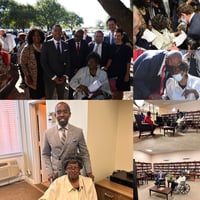Having conversations in small groups is only the beginning of the process. We have to continue the...
Let Justice Roll
“Separate is not equal,” “Justice for all,” “We the People of the United States, in order to form a more perfect Union,”….all statements that symbolize the American experiment. But that experiment, just like the people who created it, has been flawed from its inception. Race is a part of the American fabric, woven into the American experiment, but like any creation, there is not one simple step that will fix a flawed product. Through civil unrest, the American experiment has modified its original intent of equality and justice for all. Still, the final solution is a work in progress that requests both a vocal and physical reaction from this country’s citizenry and a policy response from its elected officials.
The birthplace of the civil rights movement, Alabama, is not naive to the struggle of change. It took an African American woman refusing to give up her seat and a 381-day bus boycott to spark change. It took pictures of beaten and bloody people on Edmund Pettis Bridge, being broadcast around the world to spur the need for the change in voting rights. Change is not a single action in a vacuum; it’s an arduous process often spurred on by years of action. Agitation is only the beginning and must be paired with the action of true policy change for an effective and long-lasting solution.
“Say their name,” “Black lives matter,” “I ca-n’t bre-a-th-e,” are all part of voices in a deeper cry for the larger symptom that plagues our society, revealing a concern that justice for all in this perfect union is more of a myth than a reality, a concern that the American experiment has never truly manifest itself in full. As we strive for that perfect union, we all must reflect, reexamine, and take action to cure the worst parts of the problem and to first answer, the question, is justice equally distributed? If not, what is an equal distribution of justice?
Shedding light on the problem is only the first step for change. Just as the Boston Tea Party drew attention to the unfair treatment of the American colonies, Bloody Sunday drew attention to America’s not living up to its promise of the right for every voice to be heard. Currently, the consistent refrain — black lives matter, say their name, I can’t breathe — draws attention to the systemic problem of racial inequality that has plagued American society for over 401 years. Drawing attention to the problem is only the first step to achieve the change.
America, as a participatory society, requires us to put leaders in place who reflect the best of who we are. That representation is more than talk; it’s more than forming a committee to talk more; rather, it’s having tough conversations that challenge leaders to craft and implement effective policy to address the changes we so desperately desire and then using our votes to remove those from office when they no longer represent our better angels.
Taking a step past holding elected leaders accountable involves implementing reforms that live up to our principles as a community and a nation. For example, in the last decade, law enforcement has taken a more active role in the community. That active role has led to higher visibility, highlighting several bad actors, and brought into question should our system of law enforcement be reformed? A reform in law enforcement could involve redistributing enforcement responsibility by adding new partners such as mental health, education, or social services or creating protocols that remove bad actors, in law enforcement, from the system automatically. The solutions aren’t one dimensional but rather complicated that require many voices to come to the table.
For justice to work and for our leaders to be effective, we must all participate in the process. We must develop space for tough conversations, we must denounce the parts of civic life that don’t reflect our better selves, and we have to understand that change isn’t always immediate, but it is constant. I challenge each of you to be a part of the change, not only in the moment of civil unrest but also during each election. Furthermore, the election should not be the end of your participation; it’s just the beginning. Challenge elected leaders to do better and if they don’t remove them. Your vote is only the beginning of the power that you hold. Martin Luther King said it best, “Life’s most persistent and urgent question is, ‘What are you doing for others?’”
Ashley D. Roseboro is the CEO and founder of Roseboro Holdings, a business operations consulting, private investment, and community engagement firm. He also is the President of Roseboro Foundation, a 501(c)(3) that believes every child deserves the opportunity to thrive. Before Roseboro Holdings, he served as Compliance Officer for Walton Enterprise and the Walton Family Political and Communications Office. He earned an MBA from the College of William and Mary.
Check out this story on Medium.com:https://medium.com/@roseboroholdings/let-justice-roll-f07fb746ac00



